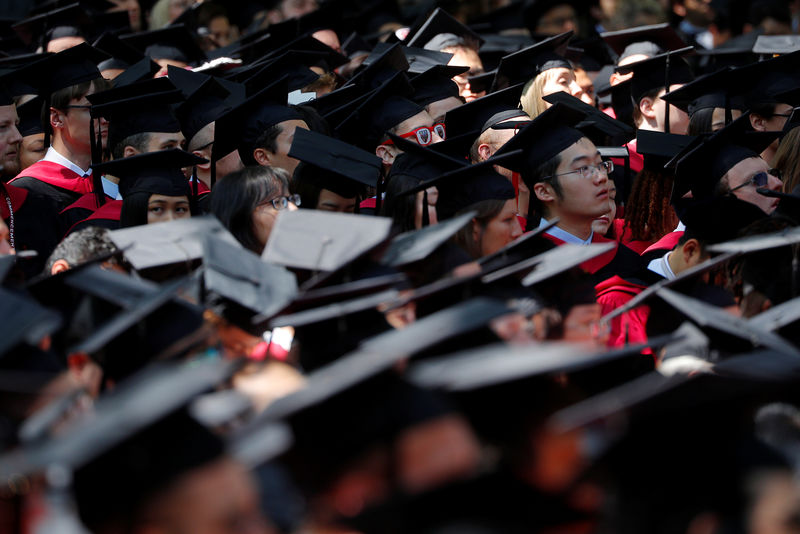(Bloomberg) -- China unveiled a sweeping overhaul of its $100 billion education tech sector, banning companies that teach the school curriculum from making profits, raising capital or going public.
Beijing on Saturday published a plethora of regulations that together threaten to up-end the sector and jeopardize billions of dollars in foreign investment. Companies that teach school subjects can no longer accept overseas investment, which could include capital from the offshore registered entities of Chinese firms, according to a notice released by the State Council. Those now in violation of that rule must take steps to rectify the situation, the country’s most powerful administrative authority said, without elaborating.
In addition, listed firms will no longer be allowed to raise capital via stock markets to invest in businesses that teach classroom subjects. Outright acquisitions are forbidden. And all vacation and weekend tutoring related to the school syllabus is now off-limits.
The regulations threaten to obliterate the outsized growth that made stock market darlings of TAL Education Group (NYSE:TAL), New Oriental Education & Technology Group and Gaotu Techedu Inc. They could also put the market largely out of reach of global investors. Education technology had emerged as one of the hottest investment plays in China in recent years, attracting billions from the likes of Tiger Global Management, Temasek Holdings Pte and SoftBank Group Corp.
In a series of statements over the weekend, all the major education companies said they would comply with the new rules and support the decisions of the party.
In a post on its official Weibo (NASDAQ:WB) account, TAL said it would “fully implement the party’s education policy” and “strive to cultivate people’s talents with all-around development of morality, intelligence and physical health.”
The regulatory assault mirrors Beijing’s broader campaign against the growing heft of Chinese internet companies from Didi Global Inc. to Alibaba (NYSE:BABA) Group Holding Ltd. It stems from a deeper backlash against the industry, as excessive tutoring torments youths, burdens parents with expensive fees and exacerbates inequalities in society.
The out-of-school education industry has been “severely hijacked by capital,” according to a separate article posted on the site of the Ministry of Education. “That broke the nature of education as welfare.”
Once regarded as a sure-fire way for aspiring children (and parents) to get ahead, after-school tutoring is now viewed as an impediment to one of Xi Jinping’s top priorities: boosting a declining birth rate.
It’s a stunning reversal of fortune for an industry that once boasted some of the fastest growth rates in the country. Alibaba, Tencent Holdings (OTC:TCEHY) Ltd. and ByteDance Ltd. were among the big names that have invested in a sector that had been expected to generate 491 billion yuan ($76 billion) in revenue by 2024. Those lofty expectations groomed a generation of giant startups like Yuanfudao and Zuoyebang. Online education platforms attracted about 103 billion yuan of capital in 2020 alone, according to iResearch.
Devised and overseen by a dedicated branch set up just last month to regulate the industry, the rules unveiled Saturday were couched in general terms that could be applied broadly to common practices throughout the industry. The new regulations are focused on compulsory subjects, meaning critical material like math, science and history. Classes for art or music mostly would not fall under the new restrictions.
Among other things, they also ban the teaching of foreign curriculums, tighten scrutiny over the import of textbooks and forbid the hiring of foreign teachers outside of China -- a curb that could have severe consequences for startups like VIPKid that specialize in overseas tutors. The government also ordered local authorities to tighten approvals for companies providing training on extra-curriculum subjects.
New Regulations for China’s Education Sector:
- Companies and institutions that teach the school curriculum must go non-profit
- Such institutions cannot pursue IPOs, or take foreign capital
- Listed companies will be prohibited from issuing stock or raising money in capital markets to invest in school-subject tutoring institutions, or acquiring their assets via stock or cash
- Foreign firms are banned from acquiring or holding shares in school curriculum tutoring institutions, or using VIEs (variable interest entities) to do so. Those already in violation need to rectify the situation
- All vacation and holiday cirriculum tutoring is off-limits
- Online tutoring and school-curriculum teaching for kids below six years of age is forbidden
- Agencies cannot teach foreign curriculums or hire foreigners outside of China to teach
It’s ultimately unclear how the government clampdown will turn out -- many believe Beijing won’t seek to annihilate an industry that still plays an essential role in grooming its future workforce.
For now, many investors may choose to err on the side of caution. The government’s desire to assert control over the economy and one of its most valuable resources lies at the heart of recent regulatory clampdowns on online industries. Companies that operate as internet platforms have come increasingly under scrutiny because of the reams of data they collect, stirring government concern over issues of privacy and security.
Online tutoring agencies will also be forbidden from accepting pupils under the age of six. To make up for the shortfall, China will improve the quality of state-run online education services and make them free of charge, the State Council said.
“All regions can no longer approve new subject-based off-campus training institutions for students in the compulsory education stage, and existing subject-based training institutions are uniformly registered as non-profit institutions,” according to the State Council notice.
(Updates with company statements from fifth paragraph)
©2021 Bloomberg L.P.
